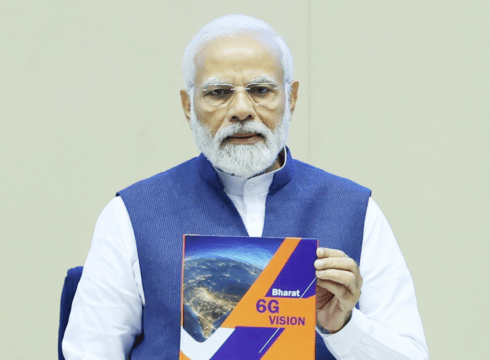PM Narendra Modi also unveiled ‘Bharat 6G Mission’, which will serve as a roadmap for the rollout of 6G services in the country over the next few years
The test bed will be used to test and validate new 6G-related technologies and serve as a platform for industry and startups to tinker with evolving ICT
The vision document has recommended creation of an INR 10,000 Cr fund to service the requirements of the industry over the next 10 years
Inc42 Daily Brief
Stay Ahead With Daily News & Analysis on India’s Tech & Startup Economy
Barely six months after the launch of 5G services, the Indian government has set its eyes on fostering the upcoming 6G telecom services in the country. In a step towards this direction, Prime Minister Narendra Modi on Wednesday (March 22) launched the country’s first 6G test bed and unveiled the ‘Bharat 6G Mission’ document.
While the vision document will serve as a roadmap for the rollout of 6G services in India in the next few years, the test bed will be used to validate new 6G-related technologies.
The test bed will also serve as a platform for academic institutions, industries and startups to test their products and tinker with evolving information and communication technologies (ICT), Modi said in his address during the inauguration of the new area office and innovation centre of the International Telecommunication Union (ITU) in the national capital.
The prime minister said that the test bed and the vision document will infuse new energy in ‘Digital India’ and provide innovative solutions to the Global South. They will also create new opportunities for homegrown innovators and startups, he added.
The initiatives will foster cooperation and collaboration between the IT sector of South Asian economies, Modi said.
Noting that India is ‘rapidly moving towards the next step of the digital revolution’, the prime minister said that the country saw the fastest 5G rollout in the world. He also said that India has become the biggest exporter of telecom technology in the world from just being a user of 4G technology earlier.
India is working with many countries across the globe on the deployment of 5G, specifically with regards to realising business models and employment potential associated with the high speed network.
Modi also announced that 500 new 5G labs will be set up in the country in the near future. These labs will spur the development of India-specific use cases for 5G technology in areas such as education, agriculture, intelligent transport systems and healthcare.
While the current Indian 5G standards are at par with global norms, the Centre plans to work together with the ITU on matters involving standardisation of future technologies, including 6G.
Bharat 6G Mission
The Bharat 6G Mission document charts out the country’s course in the area of 6G technology. It envisages designing, developing and deploying 6G network technologies that are affordable, sustainable and ubiquitous.
India’s 6G vision will have six key pillars and specific task forces that will oversee the fruition of each of these aspects. After deliberations with all stakeholders, the Technology Innovations Group has recommended the establishment of six task forces to cover various areas – Multi Platform Next Generation Network, Ecosystem for devices and systems, R&D (research and development) Finance, Standardisation, Identification of the Spectrum, and Innovative Solutions.
The task forces will be formed under the prospective Mission 6G. The Mission will be granted requisite organisational and financial resources.
“Existing organisational strengths will be leveraged to the maximum and new governance structures will be kept lean to ensure agility and speed of execution. The research and startup ecosystem will be tapped to bring innovations and new ideas to the table. Adequate provision for financial support will be made through explicit budgetary allocation…,” said the vision document.
Mission 6G will be implemented in two phases. While the first phase will be implemented between 2023 and 2025, the second phase will be implemented from 2025 to 2030.
The vision document has recommended creation of an INR 10,000 Cr fund to service the requirements of the industry over the next 10 years. As per the document, the funds should be facilitated through instruments such as grants, loans, VC funds, fund of funds, among others.
It has also recommended establishing telecom-focused VC funds and fund of funds for ‘large-size high-risk funding’ requirements, and identifying indicative processes and administrative structures to enable easy implementation of such funds.
A slew of other recommendations have also been made as part of the larger 6G Mission:
- Shared use of spectrum, particularly in the higher frequency bands where the propagation is more akin to that of light
- Participation and contribution to global standards forums to ensure interoperability and global reach of India’s innovation
- Providing fibre broadband facilities for every home and enabling integrated dense wireless and optical network
While 2G, 3G and 4G technologies arrived late in India, the country is looking to catch up with major nations in the 5G race. However, India wants to spearhead the globe in setting up 6G standards and leverage its telecom stack to sell indigenous products across the globe.
The latest announcement comes a day after Reliance Jio expanded its 5G coverage to an additional 41 cities, taking the total to 406. Earlier today, Airtel also launched its services in different parts of West Bengal, taking its total 5G coverage to 260 cities currently.
{{#name}}{{name}}{{/name}}{{^name}}-{{/name}}
{{#description}}{{description}}...{{/description}}{{^description}}-{{/description}}
Note: We at Inc42 take our ethics very seriously. More information about it can be found here.


